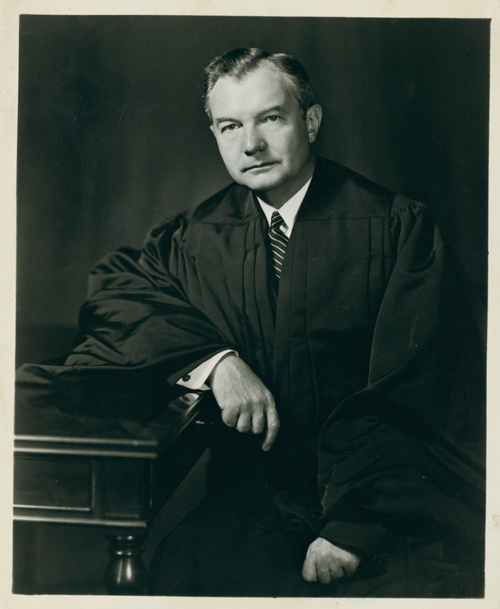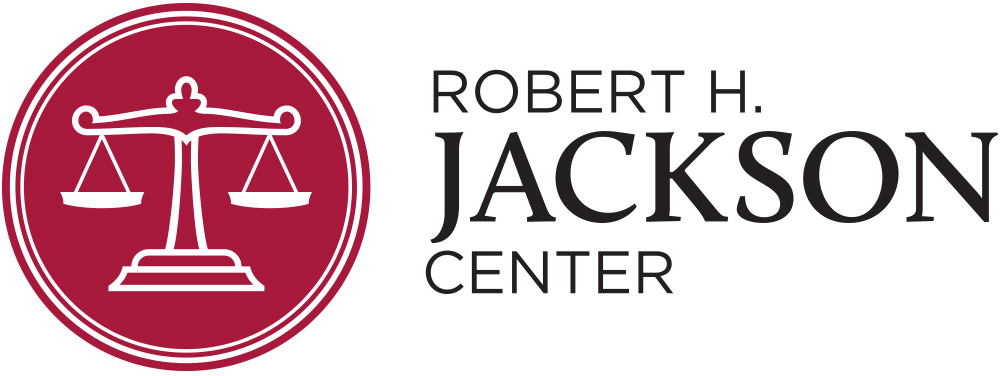
Justice at Home
“It has been well said that ‘The life of the law has not been logic: It has been experience.’ The experience that gave life to our judge-made and statutory law, at least until the last few years, was this type of country life. From such homes came the lawyers, the judges and the legislators of the nineteenth century.”
-Robert H. Jackson, The County Seat Lawyer
|
|
Welcome to Justice at Home, a special edition newsletter from the Robert H. Jackson Center that will hit your inbox every 3 weeks with updates on our virtual programming, lesson plans and lectures, and interesting finds from our digital archives.
If you enjoy this newsletter, please pass it on to a friend and share it on your social media pages. Make sure to tag us (@roberthjacksoncenter) and use the hashtag #JusticeatHome.
|
|

Every Thursday at 3pm live on our Facebook page, Tea Time with the Jackson Center takes both a look back at Jackson's place in history and a look forward showing how his legacy influences current events. You do not have to have a Facebook account to join us - simply click here to see our Facebook page, watch previous #TeawithRHJC events, and join us live on Thursdays at 3pm. The recorded videos are also uploaded onto the Jackson Center's YouTube channel.
Tomorrow’s Tea Time (June 4) features Gurbir Grewal, Attorney General for the State of New Jersey. He and RHJC President Kristan McMahon will be talking about how the pandemic is changing the justice system and access to justice.
On June 11, Professor John Q. Barrett and Kristan will step back in time to discuss the report Justice Jackson sent to President Truman in early June 1945 regarding the progress of establishing the laws and rules for the Nuremberg Trials.
On June 18, Margo Schlanger and Kristan will take a look at how prisoners’ rights have been impacted by the coronavirus.
Recent guests have included:
-Navi Pillay, the former United Nations High Commissioner for Human Rights
-Stephen Vladeck, A. Dalton Cross Professor in Law at The University of Texas at Austin
If you have a Facebook account, follow our page and share the videos with your family and friends on social media using the hashtag #TeawithRHJC.
Click here for a playlist of all of the #TeawithRHJC videos on YouTube!
|
|
What Might Have Been
On Oct. 16, 2018, Prof. Robert Tsai of American University's Washington College of Law was the keynote lecturer at the Barnette 75th Anniversary program held at the Robert H. Jackson Center. His topic was "What Might have Been," a discussion of the West Virginia v. Barnette case. Click the video above to watch Dr. Tsai's lecture in its entirety.
Dr. Tsai was a recent guest on our Tea Time with the Jackson Center virtual series. Click here to watch his discussion with Kristan entitled "What's in a Name," a discussion on the social and legal implications of characterizing the COVID-19 as the “China Virus.”
|
|

From Jackson's Desk
Robert H. Jackson was a gifted orator and writer, and many of his articles and transcripts of his speeches are housed on our website. We feature them in our weekly #TuesdayMotivation and #SundayQuote on the Jackson Center's social media pages.
In January of 1942, the West Virginia Board of Education passed a resolution that made a daily flag salute and a recitation of the Pledge of Allegiance a requirement in all public schools for both teachers and students. Refusal to participate in the flag salute by teachers was grounds for dismissal and readmission was to be denied until compliance was achieved. For students, the punishment was expulsion from school, which would result in additional liability for their parents or guardians.
Gathie and Marie Barnett were Jehovah’s Witnesses. (Due to court error, an extra “e” was mistakenly added to the end of their surname during litigation.) In deference to their belief that the Bible forbade them to bow down to graven images, they refused to salute the flag. For that refusal, they were sent home repeatedly and eventually expelled from school. Expulsion had the effect of making the children unlawfully absent, which subjected them to delinquency proceedings and their parents to criminal prosecution. Barnette brought suit seeking an injunction to restrain the enforcement of the resolution. The suit alleged that the regulation was an unconstitutional denial of religious freedom, freedom of speech, and was invalid under the due process and equal protection clauses of the Fourteenth Amendment.
Jackson wrote the majority opinion for the Court, which was split 6-3. Jackson held that making it compulsory to salute the flag and pledge allegiance was a violation of the First and Fourteenth Amendments and was not able to be justified as a means of achieving patriotism and national unity. Jackson reasoned that saying the pledge of allegiance was speech as it communicated an expression of set ideas. By making this speech a requirement, it violated the First Amendment values. He wrote:
"If there is any fixed star in our constitutional constellation, it is that no official, high or petty, can prescribe what shall be orthodox in politics, nationalism, religion, or other matters of opinion or force citizens to confess by word or act their faith therein. If there are any circumstances which permit an exception, they do not now occur to us."
It is a quirk of history that the Supreme Court decided Barnette on Flag Day, June 14, 1943, but it provides extra resonance to the decision and its educational power.
Read the opinion in its entirety here.
|
|

This Month in Jackson History
June 6, 1945- Jackson, in his role as the representative of the United States and as its Chief of Counsel for the upcoming Nuremberg Trials, issued a report to President Truman on his work at the London Conference, which outlined the procedures for the trials. Read the report here and be sure to tune in to Tea Time with the Jackson Center on Thursday, June 11 at 3pm on Facebook to hear Kristan and John Q. Barrett, RHJC board member, Elizabeth S. Lenna Fellow and St. John's Law Professor discuss the significance of Jackson's report.
June 9, 1929- Robert Jackson and his son William were confirmed at St. Luke's Episcopal Church in Jamestown, NY. Jackson was not a religious man, but his wife Irene was raised Episcopalian and attended St. Luke’s with their children. Jackson wrote of the experience in his draft essay “Faith of My Fathers; "When my son [William Eldred Jackson] was about to be confirmed, he raised the question why he should be if I had not. It was easier to be confirmed than to answer the question.” Read more here.
June 10, 1931- Jackson spoke in the Euclid Street School auditorium in Jamestown, NY, honoring his former high school teacher and important mentor Mary Rosina Willard, who died earlier that year at age 74. Read the speech here.
June 14, 1943- The U.S. Supreme Court issued its decision on West Virginia Board of Education v. Barnette. Justice Jackson wrote the majority opinion. The case was the definitive final answer in a long line of cases regarding religious liberty under the freedom of speech clause of the First Amendment brought by Jehovah’s Witnesses. It overruled their own earlier decision in Minersville School District v. Gobitis, which had upheld mandatory flag salute and expressions of patriotism within public schools. Read the Barnette decision text here.
|
|
From the Archives
Attorney General and newly selected Associate Justice of the United States Supreme Court Robert H. Jackson shows his pride as he poses with his son William E. Jackson on his graduation day from Yale University on June 17, 1941.

|
|

Join us for #GiveBigChq
June 1-11!
Our Give Big CHQ goal this year is to complete our 500-piece puzzle by raising $10,000 to help fund the continuation of our free annual programs: Living Voices to teach lessons of the Holocaust and immigration; Young Readers to nurture reading and writing; bi-annual Continuing Legal Education seminars to promote professional development; the Robert H. Jackson Lecture on the Supreme Court, plus summer Teacher Fellows, college and law school interns, civics education, and numerous topical lectures on issues of law we face as new challenges may threaten rights we should never take for granted. Will you contribute a piece to complete the puzzle with a gift of $10, $50 or $100 today? Grab 12 pieces by joining our Bench Circle with a monthly gift in the amount of your choice.
The Robert H. Jackson Center addresses puzzling questions of law and civil liberties that can only be solved with ingenuity or patient effort. With Justice Jackson as our standard bearer, we promote the art of meaningful debate, the power of the written word, and the benefits of reading to refine self-expression for elementary, middle, and high school students. For adult audiences, we bring leading experts and scholars who have devoted their lives to studying how democracies thrive when changes shake the balance between liberty and the protection of rights.
Your gifts to the Jackson Center ensure history lessons are taught on how our native son, Robert H. Jackson, had the courage to face serious challenges to civil liberties and come down on the side of protecting justice for all. Our programs are free to our audiences because we believe all voices need to be at the table for meaningful discussions.
Thank you to all who have supported us these past 19 years, and we look forward to welcoming new donors during this campaign.
|
|
Our Contact Information
*{{Organization Name}}*
*{{Organization Address}}*
*{{Organization Phone}}*
*{{Organization Website}}*
*{{Unsubscribe}}*

